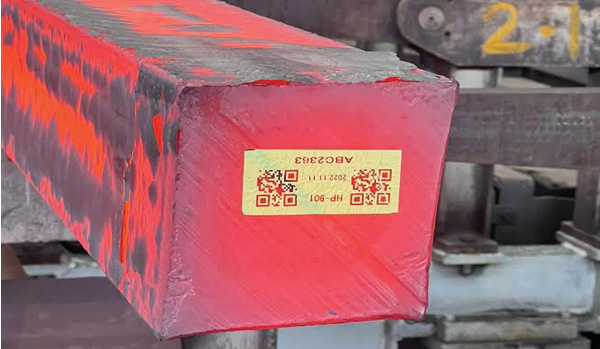
Barcode and RFID (Radio Frequency Identification) technologies are utilized by steel manufacturers to streamline various processes, enhance inventory management, improve traceability, and optimize overall operational efficiency. Here are some common applications of barcode and RFID technology in the steel manufacturing industry.
Raw Material Management
Barcode and RFID technologies are employed to track and manage raw materials used in steel manufacturing. Barcodes or RFID tags can be affixed to incoming materials such as iron ore, scrap metal, or alloys, enabling efficient identification, recording, and tracking of the materials throughout the production process. This helps manufacturers monitor inventory levels, track material usage, and optimize procurement and stock control.
Inventory Control and Management
Barcode and RFID technologies play a crucial role in managing steel inventory within the manufacturing facility. Each steel product, such as coils, plates, or beams, can be labeled with a barcode or an RFID tag, allowing for accurate and real-time inventory tracking. By scanning these labels, manufacturers can monitor stock levels, track product movements, automate replenishment processes, and optimize inventory management.
Work-in-Progress Tracking
Barcodes and RFID tags are used to track the progress of steel components or products during the manufacturing process. Each workpiece or component can be labeled with a barcode or an RFID tag, allowing for easy identification and real-time tracking. This helps manufacturers monitor the production process, identify bottlenecks, and optimize workflow efficiency.
Quality Control and Traceability
Barcode and RFID technologies facilitate quality control and traceability in the steel manufacturing industry. Barcodes or RFID tags can be associated with quality-related information such as production details, inspection data, or test results. This allows for efficient identification and tracking of individual steel products, ensuring compliance with quality standards, regulatory requirements, and customer specifications.
Asset and Equipment Tracking
Barcode and RFID technologies are employed to track and manage assets and equipment used in steel manufacturing facilities. By affixing barcodes or RFID tags to machinery, tools, or other assets, manufacturers can monitor their location, utilization, and maintenance history. This helps optimize asset management, reduce the risk of asset loss, and ensure efficient maintenance schedules.
Logistics and Supply Chain Integration
Barcode and RFID technologies enable integration and data exchange within the steel manufacturing supply chain. By using standardized barcodes or RFID protocols, manufacturers can efficiently share information with suppliers, customers, and logistics providers. This facilitates seamless collaboration, improves visibility across the supply chain, and enhances overall operational efficiency.
Safety and Compliance
Barcode and RFID technologies can be utilized to enhance safety and compliance in the steel manufacturing industry. Barcodes or RFID tags can be used to track safety inspections, equipment maintenance schedules, or operator certifications. This helps ensure compliance with safety regulations, improves workplace safety, and enables efficient management of safety-related information.
Major steel manufacturers leverage barcode and RFID technologies to optimize inventory management, enhance traceability, streamline production processes, and ensure compliance with quality and safety standards. These technologies contribute to improved operational efficiency, accurate inventory tracking, and enhanced productivity in the steel manufacturing industry.